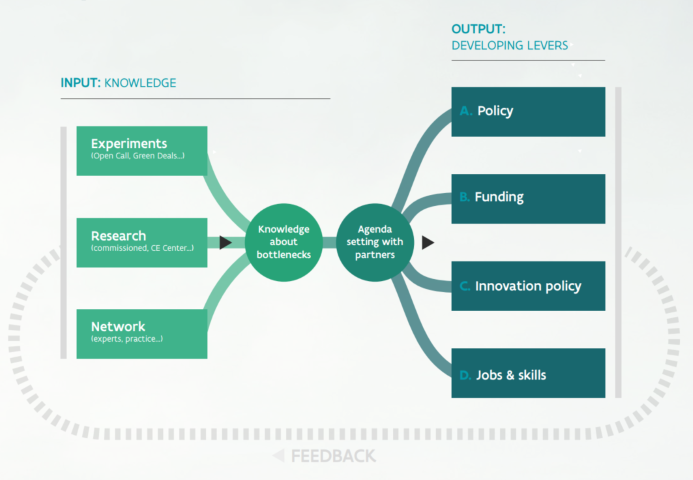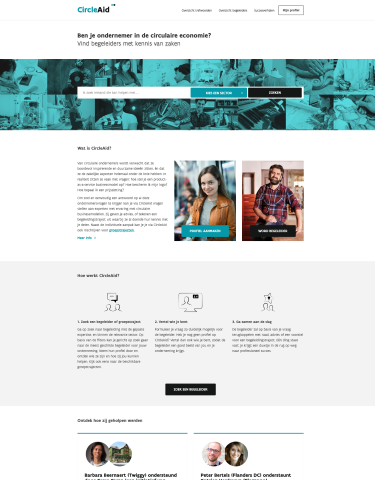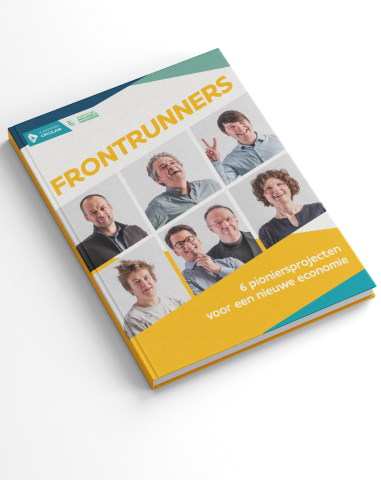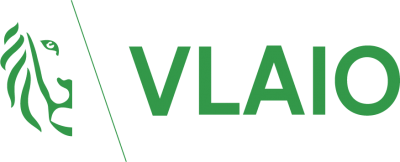Topics
We organise our actions in six thematic & strategic agendas:
Strategic Agendas:
Bio-economy
Circular Construction
Chemicals/Plastics
Manufacturing Industry
Food Chain
Water Cycles
Seven leverages provide additional support:
Leverage effects:
Lever Policy Instruments
Lever Circular Procurement
Lever Communication
Lever Innovation & Entrepreneurship
Lever Financing
Lever Jobs & Skills
Lever Research
What, why and how?
Why are we pursuing a circular economy?
Future visions 2050
How do we see our circular future?
About our management
Who steers what at Flanders Circular?
A snapshot
Working on levers, to include the recruitment of a new colleague, will take top priority from autumn 2019 onwards.

The aim of these experiments is to accumulate knowledge and know-how on circular levers and bottlenecks. From that point on, we can develop a number of different levers that ensure that the knowledge gained is translated into specific, tailored solutions.
Naturally, this is something we have to accomplish with other partners and governments. That ranges from the local authorities, to the other regions and the federal government – all the way up to the EU. We are actively on the lookout for new partnerships with other EU leaders in a circular economy (The Netherlands, Sweden, etc.).
Why are we doing this?
To grow, good ideas need the right framework. A circular plan might be a nice idea, but if it conflicts with regulations, or fails to gain the funding needed to stimulate growth, it may never get off the ground. And that's at the heart of our work on the preconditions/levers. There can be no a circular economy without sufficient policy and regulation, funding and innovation support.
1) Intra-Belgian Circular Economy Platform
Circular Flanders is deeply involved in the Circular Economy Intra-Belgian Platform. It functions as a consultation platform, or hub, for the regional administration bodies and the federal government. It was launched in 2018 under the chairpersonship of OVAM. Content-related preparation occurs in three different working groups:
- indicators;
- material flows (with connections to product standards and ecodesign;)
- financing of a circular economy.
2) Contribution to EU policy
The Coordination Committee for International Environment Policy (CCIEP) enables Belgium to represent itself with a single voice and well-considered environmental positions, in the presence of numerous international institutions and organisations. OVAM, in coordination with Circular Flanders, takes the lead when the Circular Economy, among others, is on the CCIEP agenda.
We work with OVAM to conduct international missions. These are both incoming (reception of delegations) and outgoing missions (accompanying Flemish or Belgian delegations abroad).
We also regularly give lectures or presentation on Circular Flanders at European forums.
3) Circular Construction Living Lab
The living lab is the research wing of the Green Deal on Circular Construction. Based on practical experiences and experiments, researchers will devise policy and make practical recommendations to accelerate
the transition to a circular economy in the construction sector.
The Living Lab operates according to three topics:
1. compass group (defining research questions);
2. sites and projects (field experiments);
3. research (analysis of findings).
4) Study: Legal bottlenecks in circular economic projects (to be published)
Hasselt University (Faculty of Law) was commissioned by Circular Flanders to carry out a circular study on the legal bottlenecks that impede the
transition to a circular economy. They accomplished this by carrying out a legal audit of a number of specific circular economy-related projects.
The following topics were addressed:
1. waste law: when is a material or product considered waste?
2. sustainable/circular public procurement;
3. product standardisation and intellectual property;
4. sub-platforms and product-as-service;
5. experimental legislation and regulatory zones.
1) Influencing the European agenda
- We took an active role in the European expert group on financing the circular economy and the task force on the development of a European taxonomy for CE.
- We used the Urban Agenda to monitor and provide input on the development of a circular city funding guide for all EU cities and towns.
- Through the Department of Environment, we monitored and made sporadic contributions to the policy development on sustainable finance at the EU level.
- We maintain contact with the European Commission and the European Investment Bank to facilitate the financing of circular innovation.
2) Assisting Flemish start-ups to scale up with Flemish Environmental Holding (VMH) funds
The Flemish Environmental Holding (VMH) is a public investment company that aims to invest in promising circular growth companies. Instead of
working with subsidies, they purchase shares in the company’s equity, i.e. the provision of venture capital. We work closely with VMH:
- we promote VMH as a source of financing;
- we initiated and held some 15 talks with Flemish companies attended by a VMH representative, each with a view to VMH financing (as of spring 2019).
3) Matchmaking & advice for companies in their quest for the right financing
We held approximately 50 meetings and networking events with companies and organisations specifically aimed at assisting them with financing their circular plans.
4) Setting up cooperation with the financial sector
We regularly meet with Febelfin and the Belgian Lease Association to see how we can achieve progress through cooperation. A number of promising avenues are in the works.
5) Interregional and federal dialogue
- We play an active role in the financing working group of the Intra-Belgian Circular Economy Platform. This platform is a hub for Belgium’s various governments to exchange knowledge and work on a shared agenda.
- We follow up Applied Scientific Research on the Environment (TWOL) studies on funding that are initiated by other policy areas.
6) Identify obstacles and formulate recommendations
With Circular Flanders support, Econocom and Belfius Lease conducted a study on the bottlenecks of leasing as a financing formula for a circular economy, including:
- 115 pages full of new insights on the circular economy;
- the bottlenecks faced by and opportunities available to financial service providers, companies and governments;
- best practice examples of circular financing.
We began discussions with the financial sector and administrative offices in relation to individual cases aimed towards finding a solution to specific bottlenecks.
7) Raising awareness through communication
We held bilateral talks with the majority of Belgian financial institutions.
We also partnered with VLAIO (the Flemish Agency for Innovation and Entrepreneurship) to
- produce the From A to Z brochure;
- we show companies how to apply for and access VLAIO subsidies and vice versa via our communications;
- we integrate circular economics into VLAIO's Finmix consulting process.
We use presentations and workshops centred on financing to guide (potential) company entrepreneurs and employees.
1) Collaboration with spearhead clusters
Spearhead clusters are partnerships between companies, knowledge institutions and government (triple-helix) that develop and implement an ambitious long-term strategy and competition programme for a domain that is strategic for Flanders.
The task of the spearhead clusters is to enhance the transition priorities. It's for this reason that VLAIO initiated work in 2018 to support the clusters with projects in the fields of industry 4.0, a circular economy, energy and mobility. The focus is on projects where several spearhead clusters are
involved.
The focus in 2018 was initially on identifying cooperation opportunities. In addition, VLAIO and Circular Flanders screen the project portfolio of the clusters annually to specially highlight a number of frontrunner projects.
The results were 'Frontrunners - 6 pioneering projects for a new economy'. It assembles intriguing stories about innovation projects carried out by the spearhead clusters.
2) Circular Flanders in the VLAIO network
VLAIO stimulates and supports entrepreneurship through structural partnerships in which organisations tackle challenges with an offer tailored to the needs of entrepreneurs (e.g. information sessions, workshops, individual or group coaching).
The circular economy is turned into a more central point of focus in consultation with these partners. Circular Flanders established contact with EY, Flanders DC, Voka and Unizo. We also gave a number of presentations at regional departments on the funding options available for circular economy projects.
3) Coordinating Circular Flanders’ support services - VLAIO
Circular Flanders taught a course on the circular economy to the VLAIO team of business advisors. The objective was to enable them to integrate this theme into their services.
The Strategic Business Processes Team has also boosted its collaboration with Circular Flanders. More specifically, the business advisors guide a number of companies towards submitting a funding application, and we exchanged information about companies that were excluded from the Open Call, but that might be eligible for additional follow-up by a VLAIO business advisor.
Relying on an internal circular economy-based working group, VLAIO makes the subject of circular economy more prominent internally and the Agency stimulates inhouse knowledge sharing. Circular Flanders is a member of this working group.
One result of this cooperation will be a brochure on potential funding for circular economy projects and including an overview of circular economy projects financed by one of the VLAIO instruments (expected by the end of 2019).
4) Development of the 'CircleAid' expert database
VLAIO developed the Co-pilot [Kopiloot] website in partnership with Flanders DC. Entrepreneurs can use the Co-pilot website to ask experts questions about their comprehensive experience in the cultural and creative sector. They provide advice or draw up a guidance programme that includes sharing their know-how throughout the process. In addition to the individual approach, Co-pilot also offers group workshops.
Later, we developed a different version of the tool with VLAIO, geared towards entrepreneurs in the circular economy. We christened it ‘CircleAid’. CircleAid will go live at the end of 2019.

‘If we could build an economy that would use things, rather than use them up, we could build a future that really could work in the long term.’
Ellen MacArthur, founder of the Ellen MacArthur Foundation


















